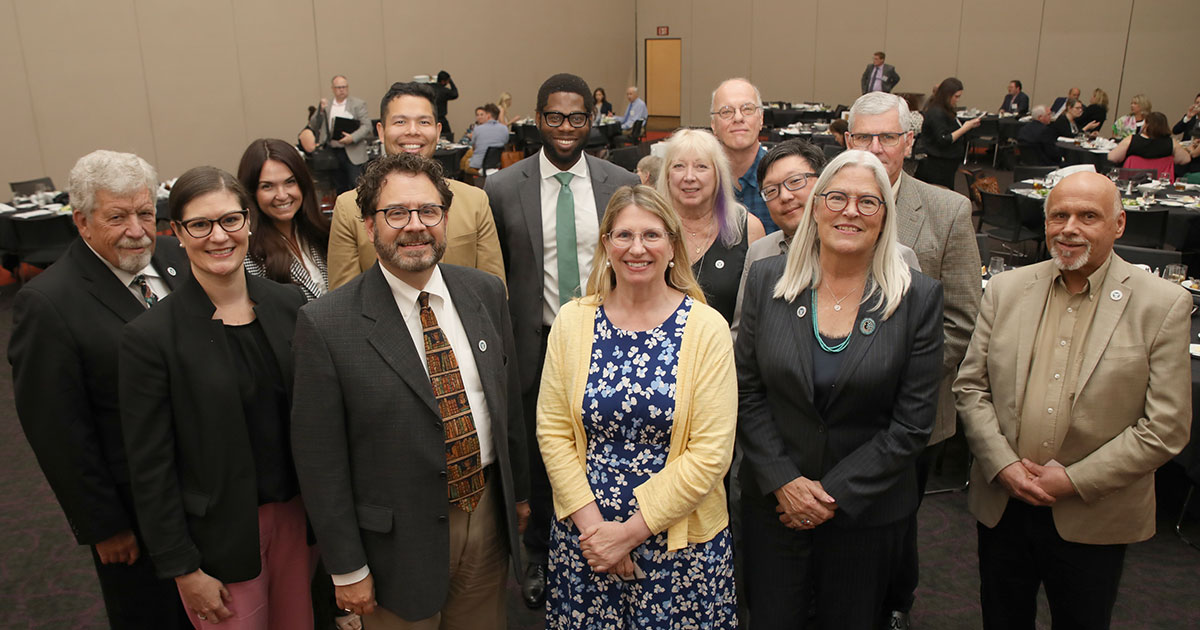
Outgoing members of the State Bar of Wisconsin's Board of Governors were honored by outgoing State Bar President Dean Dietrich at a luncheon prior to the board's final meeting of the fiscal year.
June 20, 2024 – The State Bar of Wisconsin kicked off its 2024 Annual Meeting & Conference in Green Bay yesterday as the Board of Governors took several actions at its final meeting of the term and heard opening remarks from Director of State Courts, Judge Audrey Skwierawski.
The 52-member Board of Governors, holding its fifth meeting of the fiscal year 2024 (July 1, 2023, to June 30, 2024), convened at the KI Convention Center to open proceedings of the Annual Meeting & Conference (AMC), which draws judges and lawyers statewide.
Following the meeting, the State Bar held the swearing-in ceremony for incoming State Bar President Ryan Billings, with numerous past presidents and other distinguished guests on hand to welcome Billings and thank outgoing President Dean Dietrich.
Revisit wisbar.org and the State Bar’s social media channels for coverage of the swearing-in ceremony and continuing coverage of the 2024 AMC.
State Bar Approves FY 2025 Board Chair
Melodie Wiseman will serve as the next chair of the Board of Governors in fiscal year 2025 (July 1, 2024, to June 30, 2025). Wisemen is a Nonresident Lawyer Division (NLRD) board representative, and an assistant general counsel at Stride Inc.
A Nominating Committee recommended Wiseman to serve as chair, and the board approved the recommendation. Wiseman, who began a four-year term as NLRD representative in 2021, succeeds outgoing chair Joseph Cardamone III.
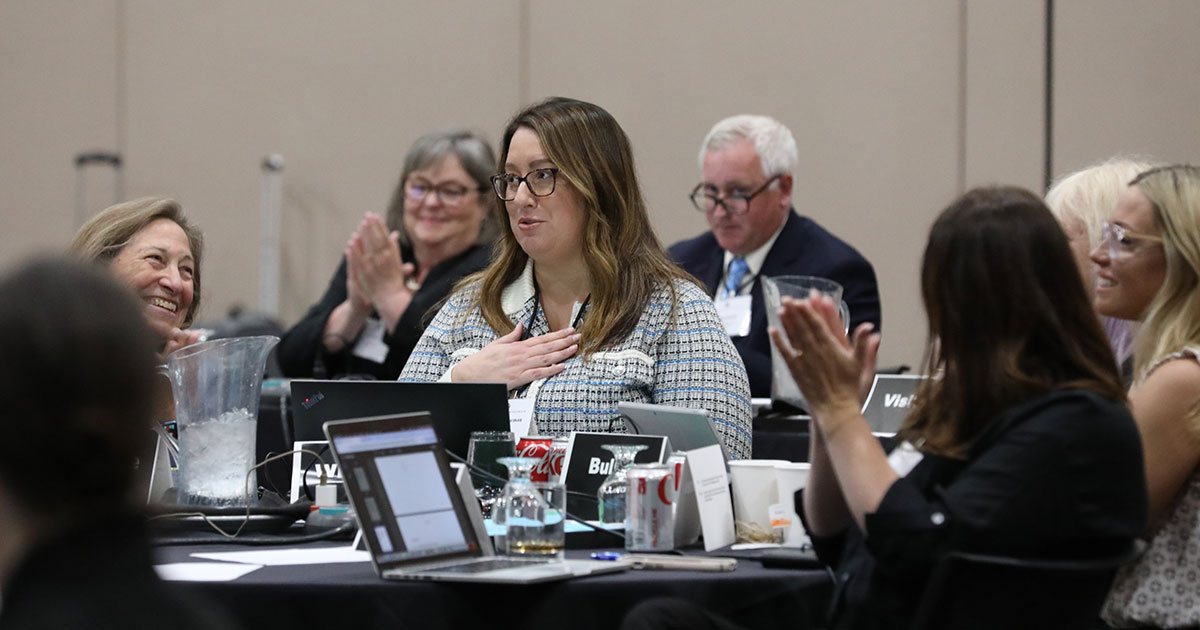
Melodie Wiseman will serve as the next chair of the Board of Governors in fiscal year 2025. Wisemen is a Nonresident Lawyer Division (NLRD) board representative, and an assistant general counsel at Stride Inc.
State Bar Elects FY 2025 Executive Committee
The board elected six board members to the State Bar’s Executive Committee, which exercises the powers and duties of the Board of Governors between meetings.
Members of the committee include the president; the president-elect; the immediate past-president; the Board chairperson; one representative each from the Nonresident Lawyers Division, Government Lawyers Division, Young Lawyers Division, and Senior Lawyers Division selected from their Board representatives; and six additional members elected annually by the Board at its final meeting of the fiscal year.
The six additional members elected to serve in FY 2025 include: Randall Brotherhood, James Goldschmidt, Erik Guenther, Lisa Lawless, Rachel Maes, and Anabelle Vang.
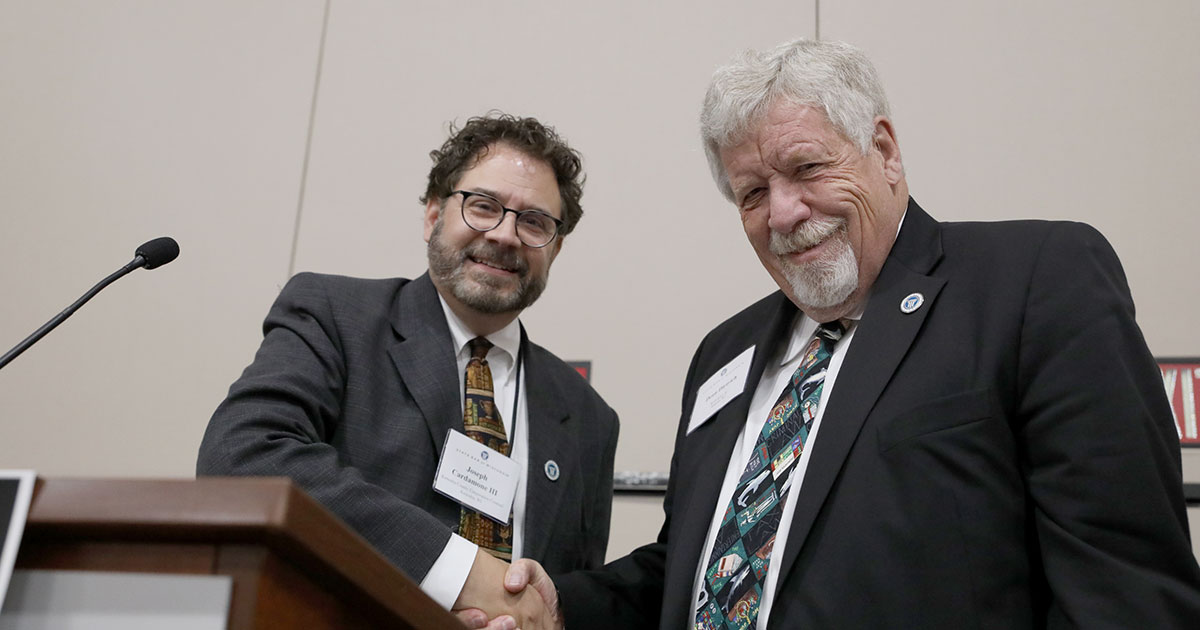
Joseph Cardomone III (left) served as chairperson of the State Bar's Board of Governors in FY 2024. He is congratulated by outgoing State Bar President Dean Dietrich.
Board Supports Revised Petition from the CLE Committee
The board unanimously supported a petition that would allow lawyers, on a voluntary basis, to obtain up to six CLE credits per reporting period for diversity programming related to “cultural competence” and/or “reduction of bias” within the legal system. Under the approved proposal, the State Bar defines these categories as follows:
Cultural Competency means “a course designed to improve client communication and representation through the lens of knowledge and of diverse populations with a sensitivity to cultural and other differences in personal traits for application when interacting with members of the public, judges, jurors, litigants, attorneys, and court personnel.”
Reduction of Bias means a course designed to educate attorneys to identify and reduce from the legal profession, the practice of law and the legal system at large, biases against persons because of, but not limited to age, race, gender, gender identity, economic status, veteran status, creed, color, religion, national origin, disability, or sexual orientation and to remove barriers to access to justice arising from discriminatory behavior.”
Obtaining such credits would not be mandatory. But the proposal would ensure that attorneys seeking such programming would be CLE credit eligible.
While CLE in this area is currently offered, it may not qualify for credit, which is determined by the Board of Bar Examiners (BBE). Adoption of the petition would allow the State Bar and other CLE providers to develop programs that will qualify for credit.
Several board members noted how such programming helps lawyers gain competence in representing a diverse clientele.
The CLE Committee, which brought the proposed petition forward, revised the proposal after robust discussion, suggestions, and recommendations at the April board meeting.
The unanimous approval allows the State Bar to submit a petition to the Wisconsin Supreme Court for consideration.
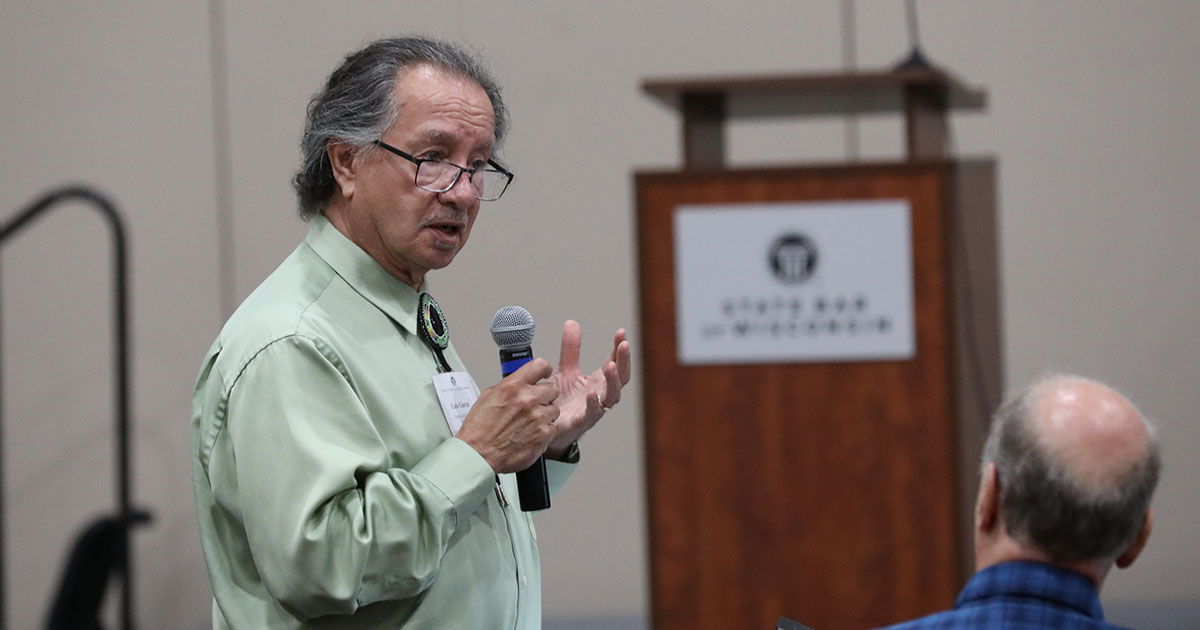
Dist. 100 Gov. Luis Garza weighs in on a proposed petition that would allow attorneys to voluntarily obtain CLE credits for programs related to "cultural competence" and the "reduction of bias in the legal profession."
Board Approves New Reserve Policy
The board approved a new reserve fund policy applicable to the State Bar’s reserve funds. Under the new policy, the State Bar will maintain a single multi-purpose “operational reserve” fund.
The operational reserve fund will no longer be earmarked for individual purposes. Instead, the purpose of the operational reserve fund will be:
to sustain the State Bar in case of an unexpected financial crisis;
to provide money for both the anticipated and unanticipated purchase of real estate and fixed assets; and
to take advantage of opportunities that fall outside the budgeting process but align well with the State Bar’s purpose of serving members, the Supreme Court, and the public.
The State Bar Executive Director will advise the board on events that require the use of operational reserve funds. The board may release funds from the operational reserve by a majority vote.
However, the Executive Director may use operational reserve funds without action by the board if he or she is faced with a situation where the State Bar would be harmed if the action were to be delayed, as long as he or she subsequently informs the board (the board can then restore the money to the operational reserve).
The preferred level for the operational reserve is six months of operating expenses plus:
$1.5 million for future building and equipment needs;
$1.5 million for potential business opportunities; and
100% of the section carry-forward reserve.
The maximum level for the operational reserve will be capped at nine months of operating expenses plus:
$4 million for future building and equipment needs;
$4 million for potential business opportunities; and
100% of section carry-forward reserve.
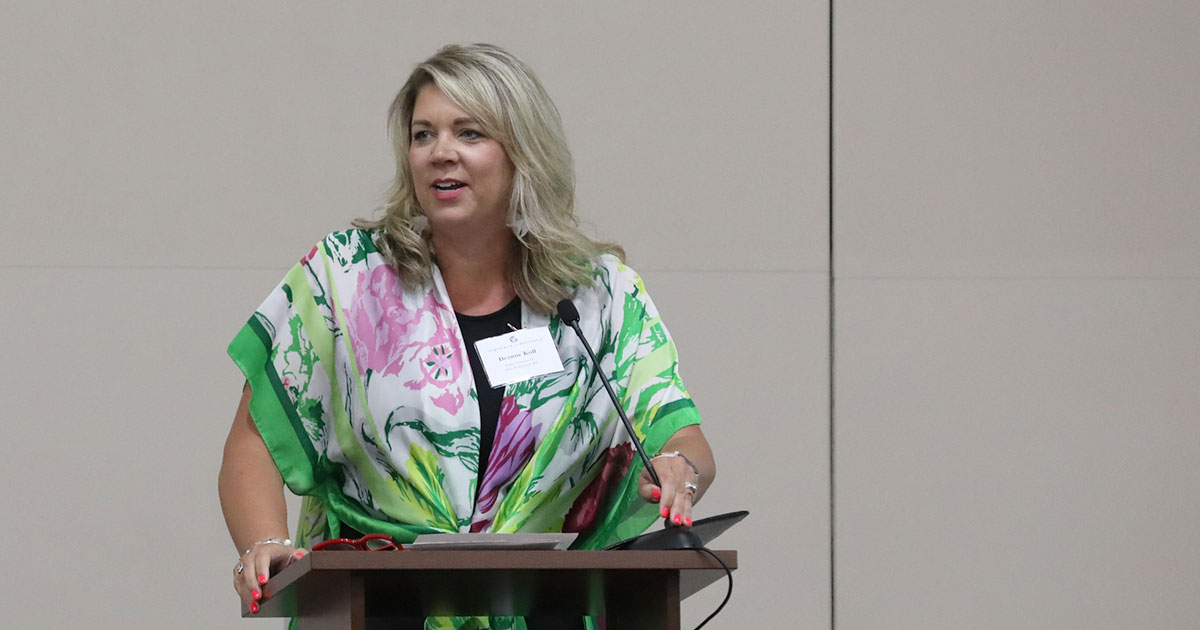
State Bar Treasurer Deanne Koll, a member of the State Bar's Finance Committee, updates the board on the State Bar's budget.
Other Business
Board members took the following additional action at the meeting:
Approved the appointment of Mitch, Anna Muñoz, Chuck Stertz, and Tim Seidel to the Wisconsin Trust Account Foundation Board
Elected Elisabeth Bridge, Tatiana Shirasaski, and Amy Wochos to the American Bar Association of House of Delegates.
Approved ta request from the Solo, Small Firm & General Practice Section to Amend the section’s bylaws.
Opening Remarks by Judge Audrey Skwierawski, Director of State Courts
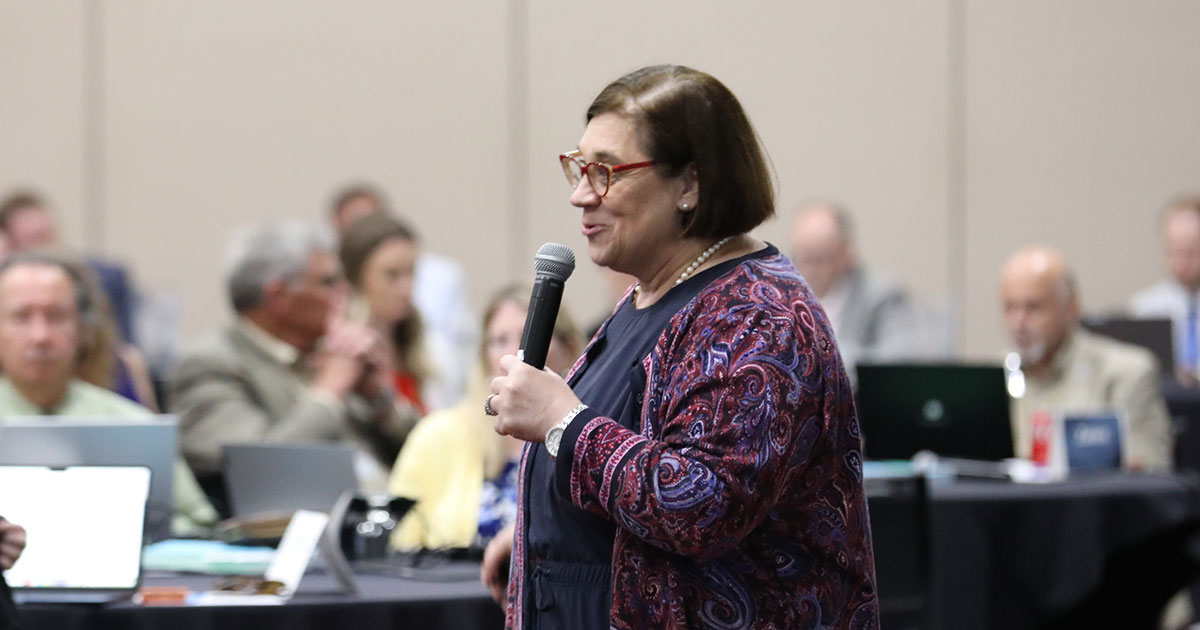
Court security, the court system’s continued backlog and collaborating to tackle Wisconsin’s attorney, court reporter, and interpreter shortages are big-picture issues for Judge Audrey Skwierawski, Director of State Courts.
Since 2021, the board has invited the Director of State Courts to provide an update on the pressing issues of the day for Wisconsin’s Court System.
Skwierawski, previously a Milwaukee County Circuit Court judge, succeeded Judge Randy Koschnick as Director of State Courts in December 2023.
“Every day is putting out a lot of fires, and that’s the nature of the job. At the same time, I’m trying not to lose track of the bigger picture items,” said Judge Skwierawski.
Skwierawski discussed recent court security legislation, noting the legislation’s origin: the murder of Juneau County Circuit Court Judge John Roemer in 2022, in his own home, by an aggrieved litigant recently released from prison.
“I just want you to understand the genesis of our legislation and what our judges are up against every day, and I include myself in that,” she said.
“Even though I’m no longer an active judge, I’ve seen hundreds and hundreds of cases. Unfortunately, in every case, at least 50% of the people walk away unhappy.”
The court worked to develop an increased security plan. In March, the Legislature and Gov. Tony Evers enacted a judicial security legislation, which the State Bar supported.
Other Priorities
Judge Skwierawski said the Director of State Courts Office is putting together various efforts to attack the court reporter shortage, which “will only intensify as many stenographic reporters near retirement age.” Interpreter shortages are also a reality.
“In addition, as you all know, there’s an attorney shortage, and we are thrilled to be partnering with the State Bar of Wisconsin in the recent creation of a committee … to take a look at the attorney shortage issue, particularly in some of the more rural areas.”
She said remote hearings must be part of the equation. “We may need to send people into the courtroom to sit next to judges who feel particularly uncomfortable with technology, and I’m prepared to do it because I’ve seen first-hand how amazing Zoom in terms of enabling lawyers to appear in different parts of the state.”
In terms of the court’s backlog, she said “it has proven very stubborn,” particularly the felony criminal cases. She said numerous factors contribute to the pandemic-induced backlog, including new cases coming in and the shortages mentioned.
Skwierawski thanked former Director of State Courts, Judge Randy Koschnick, for his leadership and many years of service – including as director during the pandemic. “I really view my role as taking the baton and running it to the next checkpoint,” she said.
